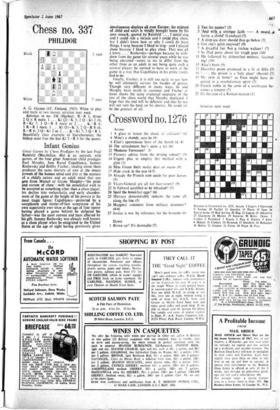Chess no. 337
PHILIDOR
Black White 5 men 7 men A. G. ()Anal T. Finland, 1965). White to play and mate in two moves; solution next week. Solution to no. 336 (Harley): B– R 1, threat 2 Q X R mute. 1 ... Kt {2)– K 3; 2 Q –Kt 2 ch, R –Kt 7; 3 Q–R 8 mate or 2 . . . K –R 6; 3 R–R I mate. I ... Kt (1)–K 3; 2 Q–A S ch, R – R 6; 3 Q– Kt 2 or 2 ... K – Kt 7; 3 Q–R 1. Beautifully clear example of line-clearance; the bishop mast free the line K1 2 –1 8 for the queen.
Infant Genius
Great Games by Chess Prodigies by the late Fred Reinfeld (Macmillan, 48s) is an account, with games. of the four great American child prodigies Paul Morphy, Jose Raoul Capablanca, Sammy Reshevsky and Bobby Fischer; reading about them produces the same mixture of awe at the innate powers of the human mind and pity at the mixture of a child's nature and an adult mind that one gets from Mozart or Gauss. Mozphy—`the pride and sorrow of chess'—with his unsatisfied wish to be accepted as something other than a chess player, his decline into melancholia and early abandon- ment of the game at the height of his powers is the most tragic figure; Capablanca—protected by a complacent and matter-of-fact acceptance of his own superiority ever since at the age of four (never having played a game before) he defeated his father—was the most normal and least affected by his gift. Sammy Reshevsky was already well known as a chess player when he emigrated to the United States at the age of eight having previously given simultaneous displays all over Europe; the mixture of child and adult is vividly brought home by his own remark, quoted by Reinfeld .. I could sing and I could ride a bicycle and I could play chess, but 1 didn't know how or why I could do these things. I sang because I liked to sing—and I played chess because I liked to play chess. That was all 1 knew. . . Reshevsky—perhaps because he with- drew from the game for several years while he was being educated—seems to me to differ from the other three as an adult in not being quite such a natural player; he seemed to have to work at the game in a way that Capablanca in his prime-rarely had to do.
Finally, Fischer; it is still too early to say how he will ultimately survive the burden of genius. Though very different in many ways, he and Morphy have much in common and Fischer at times shows the same irrational suspicion of the rest of the chess world that Morphy displayed. 1 hope that the end will be different and that he too will not turn his bark on his destiny. He could yet be the greatest of all.


































 Previous page
Previous page